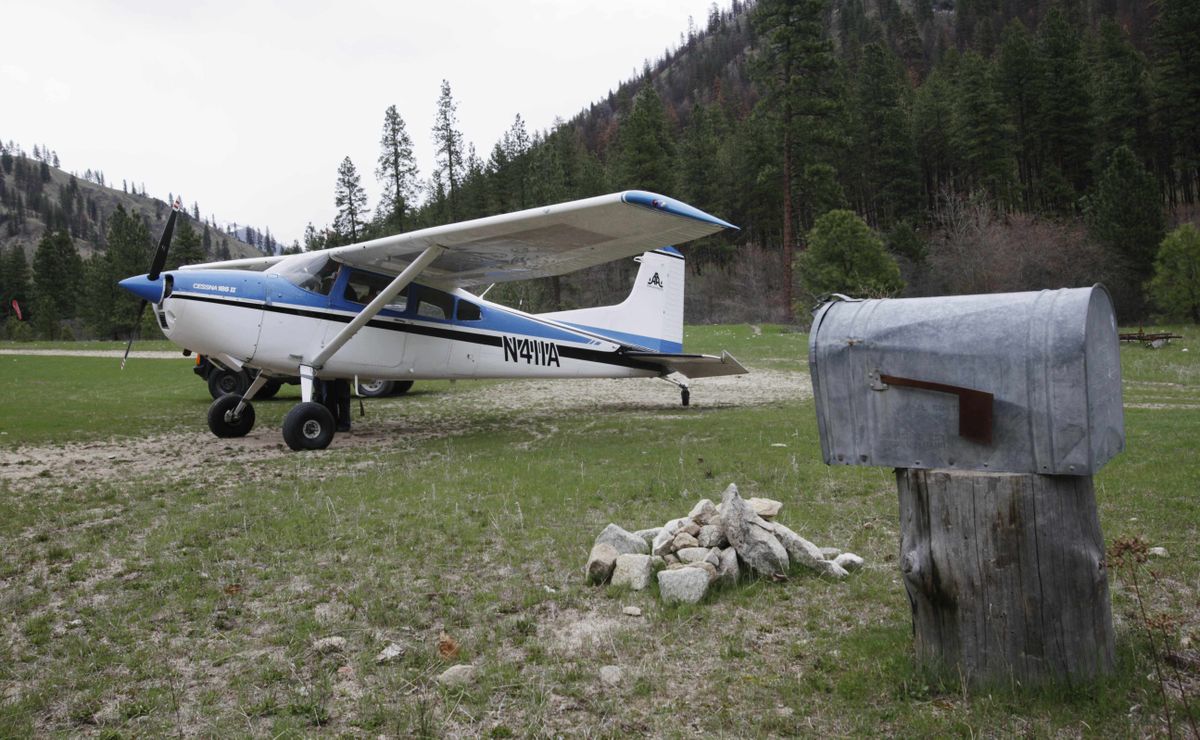Pilot preserves way of life
Mail route provides lifeline in Idaho backcountry

FRANK CHURCH-RIVER OF NO RETURN WILDERNESS, Idaho – In the small airport lounge, his former wife and business partner rattles off the weather report and frowns as a surge of wind blows open the door and invites in the morning chill.
Ray Arnold slumps in a chair holding the side of his mouth. The 72-year-old pilot had a root canal the day before. Staring out the window, he weighs years of flying experience against an uneasy sky.
At his signal, Arnold Aviation employees wheel boxes into the hangar and stack them next to the plane, the wish lists of those who live and work along the only backcountry air mail route left in the lower 48 states.
Bananas. Eggs. Canned fruit. Flour. Frozen fish fillets. Oranges. Ice cream. Stripping wax for floors. An 18-pack of Coors. And yellow mail bags, stuffed with everything from bills and letters to magazines and Netflix movies.
The pilot ticks off the items to be loaded first, guiding the workers like a backcountry Santa Claus. In the back of the plane, the parcels are arranged in the order they’ll be delivered.
“I got to get rid of the ice cream first,” Arnold said.
Deep in the Frank Church-River of No Return Wilderness, folks are waiting.
For 34 years, Arnold has served this tiny segment of Americans who prefer isolation over convenience. In a place where time seems stuck in a bygone era of the West, the weekly sound of the mail plane reminds the wilderness dwellers they are not forgotten.
Mail has been carried over the mountainous terrain on sleds and horses; and in the unforgiving cold of a central Idaho winter, carriers in the late 1800s crossed the wilderness on skis and snow shoes.
Lafe Cox signed a contract to deliver mail to mining camps, ranches and homesteads along 45 miles of backcountry in 1942. In the 1950s, the mail route was contracted to Johnson Flying Service in McCall.
About 20 years later, Arnold noticed an advertisement at the local post office. They needed an air taxi operator to deliver mail to one of the largest blocks of primitive and underdeveloped lands left in the United States.
Arnold Aviation, the lowest bidder to take over the mail route, signed the contract in 1975.
The U.S. Postal Service faces a potential $6.5 billion loss this year. Postmaster General John Potter says thousands of routes have been eliminated.
A March 24 letter notified the Idaho backcountry residents the air route would be cut. If they made the trek to the mountain town of Cascade, a daylong affair for most of them, a mail box would be available at no cost.
Arnold’s air mail route includes about 20 ranches scattered throughout the wilderness area, and a stop at Shepp Ranch serves about 30 people, said Mike Demerse, who with his wife, Lynn, organizes hunting, fishing and outdoor trips from a ranch property that straddles the Nez Perce and Payette national forests.
The Salmon River runs through their front yard.
What would losing the mail service mean? “I can’t order tractor parts. I can’t get a magazine subscription,” Mike Demerse said.
They’d survive without the mail, but that’s not the point.
“The point is, is it a basic government service or not?” Lynn Demerse said. “Is getting the mail a privilege or a right?”
Arnold delivered the postmaster’s letter to the Yellow Pine Bar caretakers on April 1. They thought it was a joke; they couldn’t imagine sustaining their livelihoods without Arnold.
“I guess it might seem to some people as selfish, to want to get your mail,” said Sue Anderson, 45, who helps maintain the ranch with Greg Metz, 46.
About a month later, U.S. Rep. Walt Minnick, D-Idaho, visited Arnold’s small hangar. The lawmaker remembered the pilot who had flown him into the backcountry more than three decades earlier, Arnold says.
He wondered if Minnick’s visit might bode a change in the postal service decision – and indeed in May, the agency ditched the plan to sever the backcountry mail contract. Minnick hailed the decision as a victory.
The postal service is exploring alternatives, requesting quotes to find out if the service could be provided at a cheaper cost. Arnold is bidding for the first time since he took over the contract in the 1970s.
The postal service would have a hard time finding another pilot to deliver the mail for less money, said pilot George Dorris. They could probably find one who is more efficient, doesn’t stop to visit, he quipped. “But the people back there won’t bring them rhubarb and cookies,” he added.
Arnold, who estimates he flies about 17,732 miles a year, has been paid $2.45 a mile for the past several years. He carries passengers and freight with the mail to break even.He asked the Postal Service for $2.95 per mile, and after weeks of negotiations, he said he and the agency have agreed on $2.85 a mile. “I’ll give ’em the dime,” Arnold said.
He has not received an official contract for the next year, he said. He’ll most likely deliver his first mail route in July on faith.